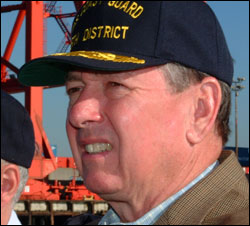THE ALMIGHTY could not have set a better theater piece. It was still in the cool morning of a hot, cloudless summer day, with an ocean breeze and the deep blue summer skies that are among the most fiercely kept secrets of Pacific Northwesterners. The sun was at my back over Pier 36 of the Port of Seattle, the U.S. Coast Guard’s Seattle facility. Before me, Elliott Bay and the snow-capped Olympic Mountains beyond the water.
It was a glorious outdoor stage, requiring only a few additional props: a podium, flags, a couple dozen folding chairs. And on the folding chairs, the final props: us.
Enter, stage left, U.S. Attorney General John Ashcroft.
Ashcroft was on the West Coast last week, as was Fatherland Secretary Tom Ridge, both visiting the “troops.” In Ashcroft’s case, this meant, in Seattle, the joint anti-terrorism task force of the type now in more than 30 U.S. cities. Ashcroft also spoke to Coast Guard personnel and toured the Seattle harbor’s anti-terrorism safeguards with a Coast Guard rear admiral. And, of course, Ashcroft paused for nine minutes to recite a boilerplate speech to local media and then took six questions. Exit, stage left.
In his stump speech, Ashcroft stared off into the distance, playing to the cameras, never making eye contact with his live audience. We weren’t there, really. In nine minutes, I counted 25 references to “terror” or “terrorist,” 17 mentions of “America” or “Americans.” It was a commercial meant to convey two somewhat contradictory emotional messages: “You should be afraid” and “We’re protecting you.”
At least he never asked us to pray. Or sing.
THIS IS AS CLOSE as we 280 million hicks living outside the Beltway ever come to a face-to-face encounter with the powerful figures who run our country. Ashcroft, like Ridge, made no public appearances here, but about 15 of us from the media, after passing through a military checkpoint, got the opportunity to record and pass on his stump speech. The subsequent questions ranged from vacuous (“Sir, if Saddam Hussein and his sons were actually killed today, will that reduce the threat of terrorist attack in the United States?”) to good but unanswered (“Will local jurisdictions receive enough federal funding to help pay the enormous costs of the new security measures we’re now required to implement?”).
I got in a question, too. What about a sequel to the Patriot Act? He actually gave an answer, sort of: that “we” were “discussing” ways to gain such additional powers, so that law enforcement could have additional “tools” for their “tool kits” in fighting terrorism.
Of course, in his response, Ashcroft made no mention of a timeline or of protecting civil liberties or respecting the Constitution. There was no mention of previously leaked proposals that go far beyond any existing measures, for example, empowering the government to strip a suspected terrorist of citizenship.
AND THAT WAS IT. Nobody had asked about the legal procedures or prison conditions now being used to terrorize noncitizens; nobody asked, even once, about civil liberties, the Constitution, or the Bill of Rights. Nobody wondered if we were even safer today than we were two years ago. With more than 2 million people in America’s prisons, there were no non- terrorism questions at all, and nobody even thought to ask what the nation’s chief law-enforcement officer was doing strutting around on a military facility and taking boat rides with an admiral. (Answer: Bush already used the flight-suit gimmick.)
I couldn’t help but think, on this glorious outdoor stage, of the men close by who weren’t enjoying the lovely day, who might have had less polite questions for Ashcroft. They hail from around the world, speak dozens of languages, and languish in an INS detention facility on South Airport Way, a few blocks east of where we sat. Most have not been accused, let alone convicted, of any crime; many face deportation and then more prison and possible torture or death for having been labeled an extremist by Ashcroft’s agencies. When Ashcroft referenced a handful of marginal terror prosecutions, and went on to cite 18,000 post-9/11 subpoenas and search warrants, those detainees represented the other fish caught in his net. They were out of sight, out of mind; nobody spoke for them or even of them.
SO MUCH FOR the watchdog media, who are the only ones with the access or opportunities to challenge powerful figures like Ashcroft in their carefully controlled world. Politicians and the staff who arrange their lives have learned how to handle the media. And the public.
Ashcroft, his handlers and security detail, the Coast Guard enlistees who watched from a neighboring pier, and we reporters never saw or heard the protesters outside the gates of the base. By the time we left, they, too, had gone.







